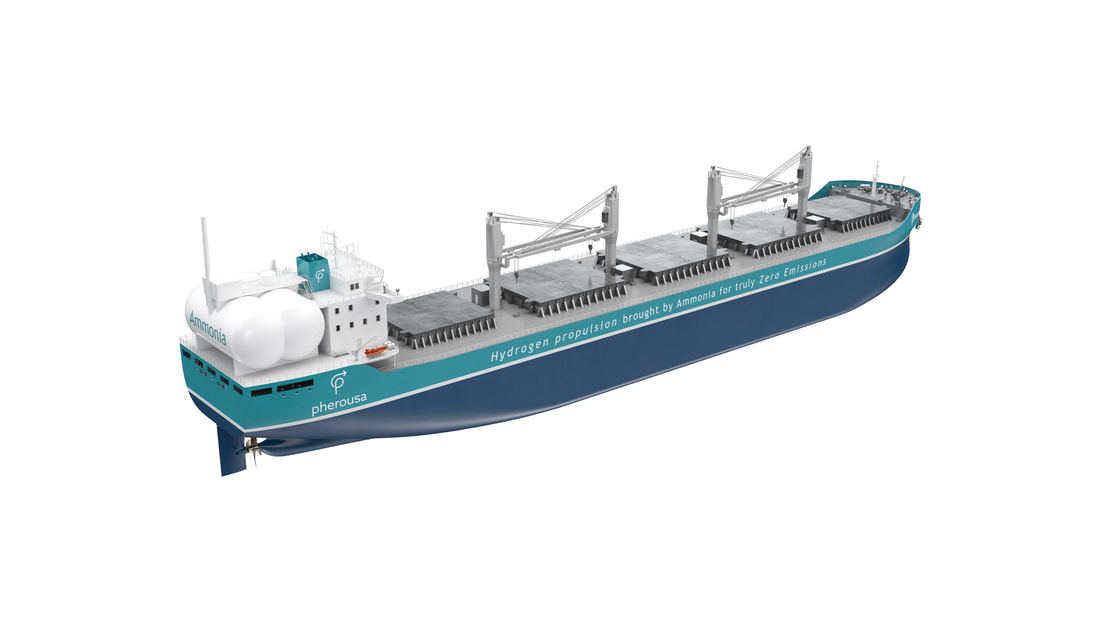The only fuel that truly has zero carbon emissions is hydrogen, but hydrogen storage is the biggest challenge for deep-sea shipping. Pherousa Green Technologies AS (PGT) has solved this challenge by developing and proving the technical feasibility of an ammonia cracker allowing the use of ammonia as a hydrogen carrier onboard vessels in deep-sea shipping.

Pherousa Green Shipping AS (PGS), established in 2023 and headquartered in Oslo, is in the design stage of placing an order for up to 6 modern green-profiled Ultramax dry bulk carriers, designed by Deltamarin in Finland. The initial ship design is based on an existing Deltamarin ultramax model, adapted for the Pherousa Green Technology using ammonia, enabling true zero-emission propulsion.
At the core of this project is PGT’s advanced ammonia cracking technology, which allows the ship’s engines to be operated with a minimal amount of pilot fuel, hence providing a truly zero-emission vessel using enriched ammonia and hydrogen as fuel. The system also enables the use of pure hydrogen in PEM fuel cells instead of direct ammonia fuel cells for electric power production.
The PGT’s cracking system provides the next step in making deep-sea shipping truly zero emissions and allows the use of ammonia and hydrogen in a cost-efficient way.
Deltamarin, a renowned ship design and engineering company with a strong focus on alternative fuels and decarbonization in deep-sea shipping, has developed an innovative long endurance ammonia fuelled Ultramax bulk carrier concept together with PGT.
“The only fuel that is truly zero emission is hydrogen, but hydrogen storage is the biggest challenge for deep-sea shipping. Ammonia is the only readily available hydrogen carrier that has no carbon in its molecule, therefore the only truly zero-carbon hydrogen carrier. The ammonia cracking technology developed by PGT is a game changer that could become a major contributor toward the realization of the world´s zero-emission shipping” says the PGT Group Chairman Hans Bredrup.
PGT will deliver the “plug and play” ammonia crackers to PGS for installation onboard the newbuildings. The two companies also aim to enter into a strategic partnership agreement to drive the development of ammonia technology for use within the deep-sea segment.
The initial fleet of 6 Ultramax dry bulk carriers is aimed at the worldwide copper industry. Copper is a key component in global decarbonisation. The Copper industry has ambitious emission-cutting goals, including to reduce the emissions produced whilst copper is transported to end users, usually across the Pacific Ocean, either from South America or Australia. Ongoing & advanced conversations have been held with leading international mining companies for their employment of the new buildings.
PGT Is also working actively with fuel suppliers, yards, and financiers to ensure the timely delivery of this high quality zero emission transportation.
PGT, headquartered on the outskirts of Oslo, was founded in 2020 by Vasilis Besikiotis and Tonny Thorsen. Besikiotis is an international expert in hydrogen and has a PhD in the field of fuel cells and electrolysis, while Thorsen has a strong commercial background with 35 years of experience in shipping.
PGT is a technology transfer company that has the rights to commercialize the technology to crack and purify hydrogen from ammonia to fuel cell quality (ISO 14687:2019) for use in the maritime sector. PGT´s first prototype has been built and delivered with excellent results on efficiency and hydrogen purity.
Helbio Holdings S.A., a wholly owned subsidiary of Swedish Stocklisted Metacon AB, as well as HAV Group ASA, listed in Oslo, possess 10% each of the share capital of PGT and are important partners for further development, implementation and commercialization of the Pherousa technology.
AMMONIA
Ammonia is a very capable, highly available, easily liquified, and non-explosive hydrogen carrier. Bunkering ammonia and cracking it to hydrogen on a board a vessel can therefore solve the storage and infrastructure challenges of hydrogen as a marine fuel, thereby paving the way to truly-zero emission shipping already today.